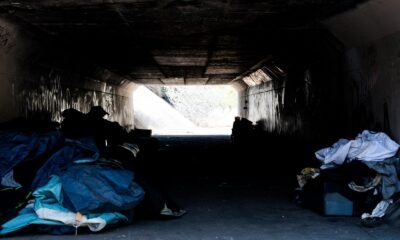arts_culture
Transforming Identity: A Glimpse into Growing Up Trans in Tucson

In her memoir “Cactus Country: A Boyhood Memoir,” author Zoë Bossiere recounts her transformative move to Tucson, contrasting it sharply with her previous life in Reston, Virginia. “Tucson was another world,” she writes. The intense sunlight and inhospitable wildlife presented a daunting landscape for a young boy trying to establish his identity. Nature here felt indifferent, and fitting in proved to be a substantial challenge.
During a particularly sweltering afternoon, Bossiere describes lying in the shade beneath the Cactus Country bathhouse, nursing injuries as blood dripped from her split knuckles. The playground equipment’s heat was unbearable, and the absence of other children intensified feelings of isolation. The once vibrant park now seemed desolate, leaving her to reflect on the stark reality of her new surroundings.
Interview: Tucson writer on seeking transformation as a kid in a local trailer park.
Amidst this harsh environment, Bossiere’s family lived in an Airstream trailer, a striking symbol of new beginnings. As she crushed comic strips, she anxiously awaited her mother’s emergence from inside. Their Airstream, akin to a mobile home, had proven a source of pride and curiosity among neighbors. Her father frequently shared stories about the trailer, its impressive size, and its vintage charm, and the family’s relocation was often viewed with fascination.
The reasons behind the move were complex. Reston had become prohibitively expensive, and life in suburbia had grown monotonous. An adventurous whim led her father to purchase the Airstream at an online auction, a decision that catalyzed their journey westward. They sold nearly all their belongings, driven by dreams of life on the road.
As Bossiere settled into life in Tucson, she grappled with the anxiety of being the new kid at school. Tomorrow marked her first day at Cottonwood Elementary, and she felt the weight of expectations. Her long-term desire to be recognized as a boy hung heavily in her mind, as she faced the uncertainty of how classmates would perceive her.
This anticipation was abruptly interrupted when a red ant bit her earlobe. As she swatted it away, her mother finally stepped out of the Airstream, signaling it was time to shop for new shoes in preparation for school.
The following morning, they drove toward Rita Ranch, the nerves in Bossiere’s stomach bubbling as her mother offered comforting words. Yet, despite her mother’s encouragement, she felt like an outsider as she entered the colorful realm of Cottonwood Elementary, surrounded by a chattering throng of kids.
A group of boys soon gathered, and one bravely approached her to ask the question that would define her first day: “Are you a boy or a girl?” The inquiry cut deep, spotlighting her internal struggle. No matter how she answered, she sensed disappointment waited behind every corner.
After a tense exchange, the other boys heckled her about her backpack. Feeling their hostility, her cheeks burned with shame. She quickly retreated, desperate to blend into the backdrop of her new school.
The whispers followed her everywhere, haunting every step she took. Amidst the curiosity and judgment, she created a mental image of the boy she longed to be, refining his persona through countless reflections in her childhood bathroom mirror. Yet, the person she saw didn’t seem to align with how others perceived her.
Dad’s excitement about the move had fueled her dreams of reinvention. Despite a childhood filled with exploration, she felt out of place, longing for the camaraderie associated with adventure and boyhood. With a poignant memory of a shopping trip for a friend’s Cub Scout uniform, where she felt ambiguity in her identity, her yearning for acceptance intensified.
After her first day at Cottonwood, Bossiere sank onto the familiar brick pathway of Cactus Country, grappling with the reality of her new school life. The sharp contrast of her experiences weighed heavily on her spirit. She was not just out of place socially; she was battling within herself.
The day had etched a reputation on her. No longer merely the new kid, she would need to earn her place among her peers—not just through appearance but by embodying the boy she envisioned. The journey toward belonging had only just begun.


















